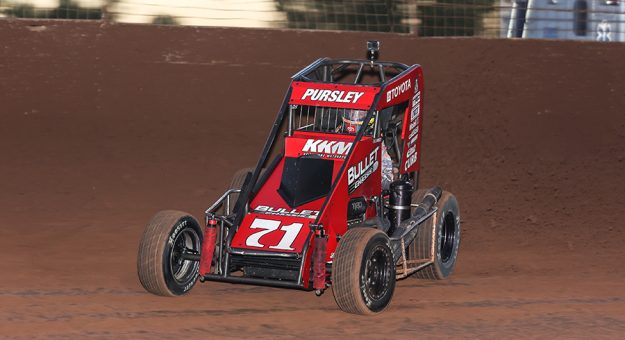“I started walking back to the pits and I had a bad feeling in my gut. Then when nothing was said over the loudspeaker, I knew that wasn‘t good,” Klint Pursley explained. “We get in the ambulance and he still had his helmet on, but he wasn‘t crying and he wasn‘t in pain. Nothing. Then we get to the hospital and the doctor said his neck was broken in two places. So I went in there to tell him and he hadn‘t shed a tear. Then he said, ‘But Dad, I‘ll be healed in time to run the Chili Bowl, won‘t I?‘ I said, ‘No son, you have to miss this one.‘ Then he shed a tear.”
Shawnda Pursley was there as well.
“I told him you broke your neck and have a spinal cord injury. That‘s why you‘re burning and you can‘t move,” she remembered.
Soon, the Pursleys received a difficult diagnosis — incomplete quadriplegic. Those outside the inner circle were forced to grapple with the notion that one so young might be restricted to a wheelchair for life. However, those who treated him and those who loved him rarely thought in those terms.

Pursley was sent immediately to ICU at Banner Desert Medical Center in Mesa, Ariz., where Dr. Jeanette Liu examined the MRI and called for immediate surgery.
Dr. Liu, among other things, fused the C3 through C5 vertebrae in Pursley‘s neck. As is typical in modern medicine more than 20 doctors were involved in the case. This was both good and bad. The family needed consistent communication and clearly identified primary doctors. Dr. Liu a neurosurgeon was naturally a key member, and Dr. Jeffrey Salomone a trauma specialist was also identified as a point of contact.
The multidisciplinary team at Banner got to work, and most importantly, so did Pursley. In the first days he could only move his right foot. The staff would remind him to try and strengthen his core so he could sit up for 8 to 12 hours. That wasn‘t good enough. He wanted to stand up. Caught between honoring a patient‘s desire and pragmatism the staff would try to temper his demand a bit. Finally, Pursley looked at them and said, “I have to stand up today to know where my failure point is. I have got to start working on that now.”
And that‘s exactly what happened.
Of prime importance, the staff at Banner were willing to work as hard as their patient. In the three weeks he was there.
“There was never a time when it slowed down where I was sitting in a bed and losing strength,” Pursley said. “They got me moving even if it was just stretching my arms and legs. They were helping me get movement back as fast as I could.”
While he feels there was never a time when he fell into depression, there were obviously moments when he stared at the ceiling and wondered what the future held. Still, he fed off of seeing the progress.
“I think it was easy for me to keep pushing because I was seeing progress every time I woke up,” he said. “Whether it was a pinky toe or my pinky finger or lifting my arm above my head it just got better. My progress was fast, so it was easy for me to stay upbeat. I think that is why I was able to avoid those depressed days and keep digging.”
Three weeks after his accident, Pursley was walking.
The next phase of his treatment came at Shepherd Center in Atlanta. Even today Pursley says it is as if his body is split right down the middle with the left side clearly weaker than the right. Once in Atlanta, he was under the care of Dr. Anna Elmers. When Dr. Elmers examined the data, she could not believe it was associated with the person in front of her. There was no way, she exclaimed, that this young man was walking.
What Pursley had to do now was relearn some basic things and use his mind to make things work properly.
“That place is just unbelievable,” he said. “The number of things they have for people with spine and brain injuries and the knowledge they have is like the Keith Kunz Motorsports of rehabilitation services.”
The use of his left hand was a particular trouble spot, but on a family outing to a movie, Pursley got his hand to close. It was a huge moment given the team at Shepherd conceded they were doubtful he would ever regain use of that hand.
